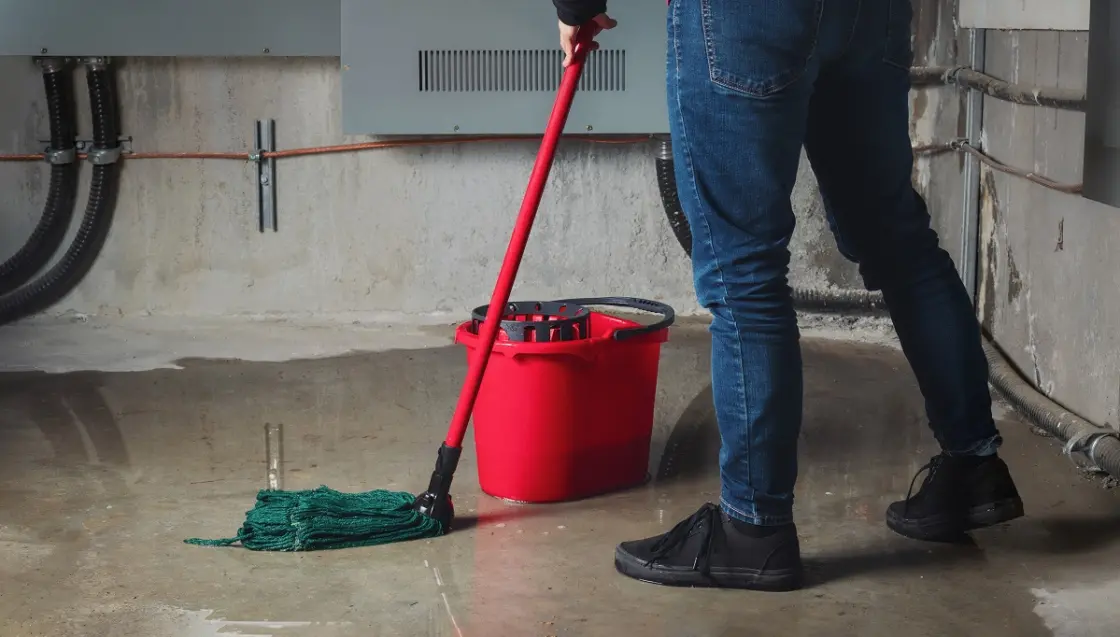How to Clean Up a Flooded Basement

Chances are, having to clean up a flooded basement was not on your to-do list today. However, when your basement looks like an indoor pool gone horribly wrong, you need to make it your top priority or risk permanent damage to your home and belongings.
Preventing basement flooding through waterproofing and regular home maintenance is always the best course of action, especially if you plan to finish your basement. However, even the most well-maintained basement can experience flooding due to unforeseen circumstances.
For example, a water-bearing pipe meeting its ultimate demise can quickly submerge the room, leaving you to dive in and deal with the issue when you notice it.
If you’re about to give cleaning your flooded basement a go on your own, then you’ll need to know how to do so safely.
We’ll cover the steps you should take below to help you restore your basement to its former glory and salvage as many of your belongings as possible after a flood.
In this article:
- Steps to Clean Up a Flooded Basement
- Stop Basement Floods Before They Happen
- Frequently Asked Questions
Steps to Clean Up a Flooded Basement
Your basement flood is obviously a pressing concern, but you’ll need to prepare before you can dip into the water to deal with it.
Safety is paramount, as is the fine print of your insurance policy. Follow the steps below to ensure you don’t compound the issue with an unexpected injury or a low insurance payout.
1. Cut your power

First things first—you’ll probably need to cut the power before you can interact with the water in any way.
If any power outlets or connected appliances have been submerged, the entire pool becomes a shock hazard. Cutting power is necessary to eliminate the risk of a nasty jolt, especially when you’re just trying to get things back to normal.
If your breaker box is also in your basement, do not try to switch off the power yourself. Call your electricity provider instead and request a serviceman’s assistance.
They know how to handle these situations and will come equipped with appropriate safety gear you may not have on hand.
2. Drain out the water
Now that you know the power is off and touching the water in your basement won’t pose a risk of an electric shock, you can focus on draining it all out as quickly as possible.
You can do this in a variety of ways, depending on what is available in your area. Activating your sump pump is a great option if you have one, but only if it can safely receive the power it needs to do the work.
If your sump pump cannot be safely powered or is not working correctly, you may need to rent a gas-powered pump instead or, at the very least, a generator that can power a pump.
If the flood is particularly severe or resulted from a bad storm in your area, it’s advisable to pump the water out more slowly. This can help prevent the wet soil outside your basement from buckling the walls and causing a cave-in.
3. Assess the damage
Once you’ve removed all the water, you should be able to better assess any damage your basement has sustained.
Pay attention to all the details and document everything of interest. All the evidence of damage you collect can be used to sway your insurance provider to provide more assistance. Take pictures and videos as you go along, as they may be useful later.
It’s important to note that many home insurance policies do not cover preventable water damage, such as flooding caused by clogged gutters. Therefore, regular gutter maintenance or professional gutter guard installation can be a valuable investment in your home.
4. Identify the cause
Cleaning up a flooded basement can be a challenge, but doing so without identifying the cause is a grave mistake. After all, there’s no sense in cleaning up if you’re going to have a repeat performance in the future.
It’s best to call in an expert if you aren’t comfortable spotting signs of hidden damage or sleuthing out the culprit of a flooded basement.
However, there are a few things that you can look for on your own before hiring help:
- Pipe failures – It should be obvious if this is the cause. Pipes in perfect condition don’t spew vast amounts of water uncontrollably, so if you see anything like that happening, you’ve likely found your main problem.
- Sump pump failures – A bad sump pump simply can’t do its job and will succumb to flooding conditions. If yours isn’t working right, a repair or replacement may be in order.
- Clogged gutters and downspouts – Your gutters are generally your first line of defense against flooding, foundation damage, and the overall deterioration of your home due to water damage. Clogged gutters cause water to flow off your roof in places that aren’t ideal, potentially saturating soil near your home’s foundation and contributing to spontaneous flooding. Your downspouts are equally important, and may require extensions to convey water far enough away from your building to prevent serious damage.
5. Salvage your belongings
Not all items can be salvaged following a significant basement flooding event. Gray and black water floods can even lead to a complete loss of all belongings due to contamination and sediment damage.
Any exposed food or medicine is a loss, and warped furniture is likely fated to grace the curbside.
However, if you’ve stored a lot of documents and photos in your basement, don’t despair just yet. Assuming the water was not terribly contaminated, many books, papers and pictures can be salvaged. You’ll need to act quickly, though.
Air-drying papers and pages is recommended, but handle them gently to avoid causing ink to run. You can also place the wet materials in your freezer once your power is restored to keep them from deteriorating before you get a chance to handle them.
6. Clean and disinfect

With salvaging out of the way, it’s grime time. You’ll need to thoroughly disinfect your basement if the water that flooded it was anything less than pristine.
Bleach is normally the cleansing agent of choice for these situations, but it might not be enough to handle the task if sewage or stormwater entered the mix.
Consider hiring experienced cleaners for the job if you don’t think you can handle it yourself. Insufficient cleaning after a contaminated basement flood could pose a serious health risk to you and your loved ones.
Stop Basement Floods Before They Happen
Attention homeowners! 🏡 Did you know that LeafFilter offers FREE estimates for your gutter protection needs? Say goodbye to clogs and hello to peace of mind with LeafFilter!✅ To learn more and get started today, visit https://t.co/6tWbQ0wMvX #ClogFree #FreeEstimate #LeafFilter pic.twitter.com/9JOuBzi7Mp
— LeafFilter Gutter Protection (@LeafFilter) July 18, 2023
Cleaning up a flooded basement is no one’s idea of a good time, but it can go a lot faster (and safer) if you follow the steps outlined above.
As is always the case, prevention beats a cure, and caring for your home attentively can help prevent flooding incidents from happening at all.
The best place to start is with your rainwater system. Your gutters should be cleaned out regularly to keep water from eroding the foundation of your home and compromising your basement walls.
Better yet, you can invest in LeafFilter gutter guards and say goodbye to clogged gutters for good.
Our award-winning, patented technology utilizes a 275 micron, stainless steel micromesh to filter out even the finest debris, such as shingle grit and pollen. It’s also backed by our limited lifetime transferable warranty and clog-free guarantee.
Give us a call today at 1-800-290-6106, toll-free or contact us for a free consultation and quote.
Frequently Asked Questions
Can you get sick from cleaning a flooded basement?
A flooded basement won’t necessarily make anyone sick, but gray water and black water floods are biohazardous enough to warrant careful cleaning with the right equipment.
Don’t take on a basement cleaning challenge you aren’t equipped to handle safely.
Should I be worried about water in my basement?
Water accumulating in your basement is never a good sign, and a full-blown flood can cause thousands of dollars in damages. If you notice water pooling in your basement, it literally pays to put an end to it early on.
Often enough, clogged gutters can be the cause of an unexpected underground pool forming in your basement. Proactively protecting your gutters can keep these kinds of disasters at bay.
How long does it take to dry out a flooded basement?
A flooded basement can take anywhere from days to weeks to dry out completely. Of course, you may be able to speed this process up by investing in a good dehumidifier and, once most flood water has been pumped out, improving ventilation.


